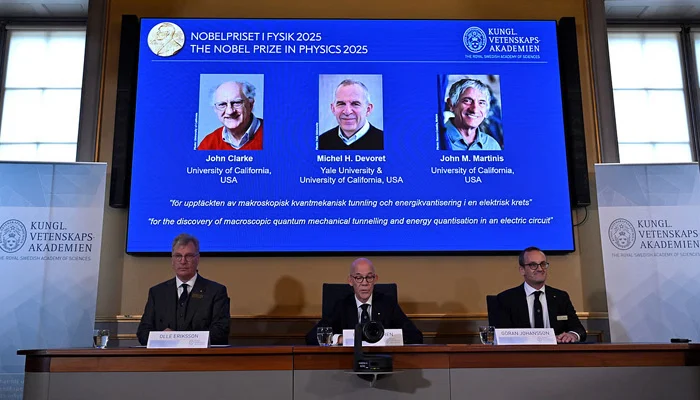Stockholm: The 2025 Nobel Prize in Physics has been jointly awarded to a trio of scientists—Briton John Clarke, Frenchman Michel Devoret, and American John Martinis—for their foundational work on quantum physics in action. The Nobel jury honored the three “for the discovery of macroscopic quantum mechanical tunnelling and energy quantisation in an an electric circuit.”
Making the Quantum World Tangible
The award recognizes experiments conducted in the 1980s that demonstrated that the bizarre properties of the quantum world could be observed on a larger, more tangible scale.
Quantum mechanics governs how matter behaves at incredibly small scales. One of its most counter-intuitive concepts is “tunnelling,” where a particle can pass straight through a barrier that would be impenetrable in the classical world. The laureates showed that this quantum phenomenon could also be observed on a macroscopic scale—involving multiple particles—by using superconductors.
The Royal Swedish Academy of Sciences noted that the researchers successfully demonstrated that “the bizarre properties of the quantum world can be made concrete in a system big enough to be held in the hand.” The discoveries have profound practical implications, having “provided opportunities for developing the next generation of quantum technology, including quantum cryptography, quantum computers, and quantum sensors.”
Olle Eriksson, chair of the Nobel Committee for Physics, emphasized the significance of the work: “It is wonderful to be able to celebrate the way that century-old quantum mechanics continually offers new surprises. It is also enormously useful, as quantum mechanics is the foundation of all digital technology.”
A Surprise for the Laureates
The three scientists are currently based in California. John Clarke (83) is a professor at the University of California, Berkeley, while Michel Devoret (72) and John Martinis (born 1958) are professors at the University of California, Santa Barbara.
Speaking to reporters via telephone during the announcement, Clarke expressed his complete surprise. “To put it mildly, it was the surprise of my life,” he said. “It never occurred to me in any way that this might be the basis of a Nobel Prize.”
Clarke explained that at the time of their experiments, the team was focused purely on the physics and did not recognize the vast practical applications that would follow, adding that the discovery’s “significant impact” was unforeseen.
Nobel Week Continues
The Physics Prize follows Monday’s award for Medicine, which honored a US-Japanese trio for their research into the human immune system.
The Nobel season will continue with the Chemistry Prize announcement on Wednesday, the Literature Prize on Thursday, and the highly anticipated Nobel Peace Prize on Friday. The awards, which include a diploma, a gold medal, and a $1.2 million cheque, will be formally presented in Stockholm on December 10, the anniversary of Alfred Nobel’s death.



